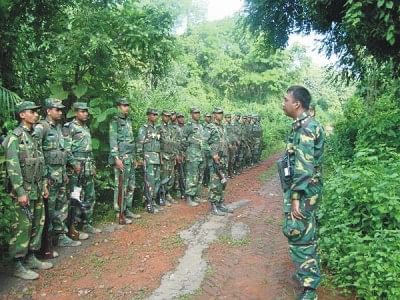Two hands are better than one

Civil-military relations generate much debate and discussion in Bangladesh because of the ups and downs, turbulence and trepidations through which the relationship has passed over the last four decades. This debate goes on not only in Bangladesh, but also in the most developed countries of the world such as in the US, UK, and in our region in India and Pakistan. This relationship has often influenced domestic policies or its external relations, besides shaping the country's security structures. Now that we are once again consolidating our democratic polity, it is important to re-examine civil-military issues, identify shortfalls and recommend measures to build a strong, and vibrant relationship between the two important segments of the society. Before we venture further, it would be pertinent to examine the historical background.
Historical background
Civil-military relationship in Bangladesh can be traced back to the Liberation War in March 1971 when young Bengali military officers of the Pakistan Army, of the rank of Major and below, along with troops under their command, revolted and joined the freedom fight at the call of Bangabandhu Sheikh Mujibur Rahman. Nine months of mostly guerilla warfare followed by a brief stint of conventional war in December 1971, saw victory and the birth of a new nation -- Bangladesh. These officers had been steeped in the Pakistani military ethos of blaming politicians for all national ills and looking down at them as corrupt and decadent. Some believed that military can administer better and must have a role in national affairs, while others, with leftist orientation, believed that the new nation should be a truly Marxist-socialist state.
The military commanders, who operated almost autonomously during the Liberation War, had gained further confidence in themselves. To their troops, and also to large numbers of irregular Freedom Fighters (FF), or Muktis, as they were called, the Commanders appeared as demigods. The loyalty of the troops was often to the Commander as a person, and not to the organisation or the state. Added to this symbiotic relationship between men and officers who participated in the Liberation War was the induction of large numbers of officers and men repatriated from Pakistan in 1973-74. These military personnel made up the so-called "repatriated" group and generally had an acrimonious relationship with the FFs. If one is to understand what happened from August 1975 to well in the 1990s, these sub-groupings and their relationships must be taken into account. Most officers who were involved in uprisings and mutinies from 1975 to 1981 were from FF groups. However, the coup by Gen. Ershad in 1982 marked the eclipse of the FFs and the emergence of the repatriated officers in the power structure of the armed forces.
For the full version of this article please read this month's Forum, available free with The Daily Star on September 6.
Air Cdre (Retd) Ishfaq Ilahi Choudhury is a Security Analyst and Registrar, BRAC University.

 For all latest news, follow The Daily Star's Google News channel.
For all latest news, follow The Daily Star's Google News channel. 




Comments